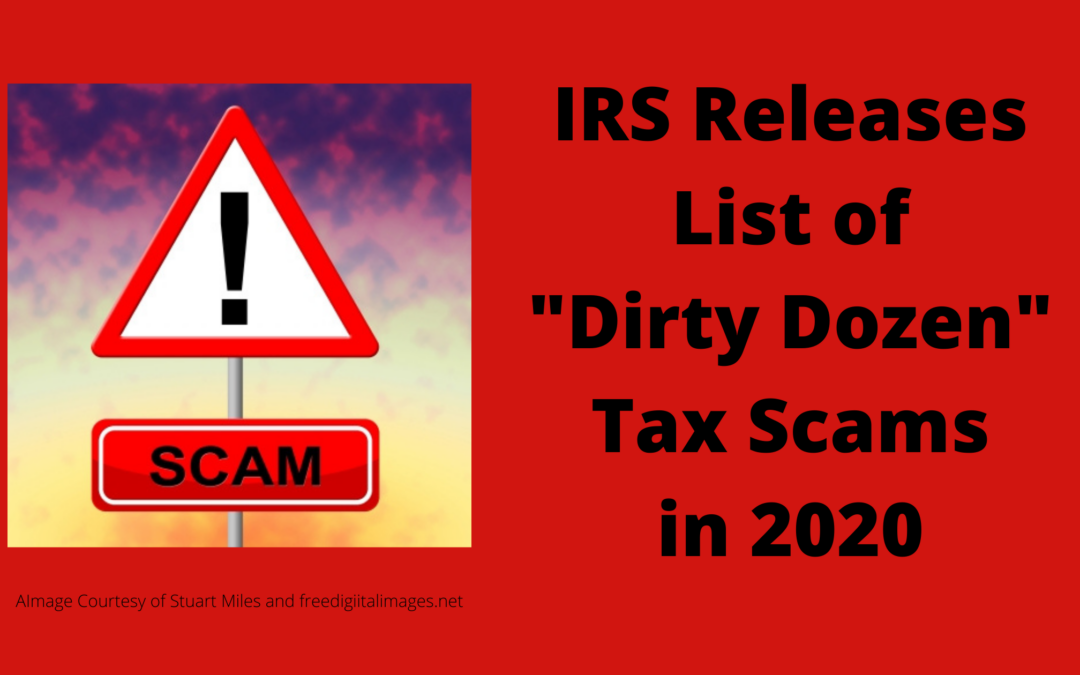The IRS recently released its list of scams to watch out for in 2020. Because of recent Coronavirus tax relief measures, scam artists are targeting taxpayers more heavily than ever before. According the IRS officials, this type of criminal activity rises surrounding tax season and in times of crisis, such as the current pandemic. To help warn people about potential scams, they publish a yearly “Dirty Dozen” list of things to watch out for and report. This year’s featured operations are as follows:
Phishing
One of the most commonly known scams, phishing involves fake emails or websites that attempt to trick taxpayers into giving them personal information. Always check the “from” address carefully before clicking links in any emails you receive. There has been a recent uptick in phishing scams using keywords such as “COVID-19,” “coronavirus,” and “stimulus.”
Fake Charities
If you receive any phone calls or emails from a charity asking you to donate to Coronavirus relief, beware. Scammers are creating fake charities to steal money from well-intentioned taxpayers looking to help out their neighbors in times of need.
Threatening Impersonation Phone Calls
Another common scam wherein you receive a phone call from someone claiming to be an IRS representative and demanding payment for taxes, often in the form of a gift card or wire transfer, has also risen amidst the pandemic. Remember, the IRS will never demand immediate payment or ask for personal information over the phone.
Social Media Scams
Social media scams aim to convince the target that a friend or family member is asking them for sensitive information over text, email, or social media sites such as Facebook and Instagram.
EIP or Refund Theft
Scammers have been stealing economic impact payments from the CARES act and performing identity theft cons by giving the IRS false information.
Senior Fraud
Seniors are still one of the largest groups targeted by conmen and women. Scammers rely on the elderly’s general lack of knowledge about technology and social media to trick them into making payments or giving their personal information that can be used to steal the senior’s identity.
Targeting Non-English Speakers
Another group commonly targeted is non-English speakers. Robocalls or calls where a live person impersonates an IRS representative are common.
Tax-Preparation Fraud
Make sure you trust the professionals who are preparing your tax return and handling accompanying documentation as there is a rise in unscrupulous financial “professionals” taking sensitive information from clients.
Offer in Compromise Mills
Some companies seek hefty fees to help taxpayers apply for an Offer in Compromise, wherein tax payments are settled for a lower cost, even if the filer is unlikely to qualify. The IRS recommends using the Offer in Compromise Pre-Qualifier tool on their website to check eligibility before hiring help with your application.
Fake Payments with Repayment Demands
Criminals have also been filing fraudulent tax returns using stolen identities and depositing the resulting refund payment into the bank accounts of their targets. The scammer then calls the taxpayer posing as a member of the IRS and asks for the payment back in the form of the gift card, claiming that there was a processing error.
Payroll and HR Scams
Con artists often steal W2’s and other tax information from payroll and HR departments and use it to run gift card and direct deposit scams.
Ransomware
Ransomware seeks to infect a victim’s computer, software, or server. Malware, a type of invasion software than can be easily accidentally downloaded, tracks keystrokes to gain access to the user’s personal information, including passwords, financial information, and even social security numbers. The hackers then attempt to extort payment from the victim via pop-up window or anonymous messaging platform in exchange for not using the information.
If you encounter any suspicious activity that you think may be related to a dirty dozen scam, disengage immediately and report your experience to the IRS. The original Dirty Dozen list for 2020 can be found on the IRS website here.
Image Courtesy of Stuart Miles and freedigitalphotos.net
